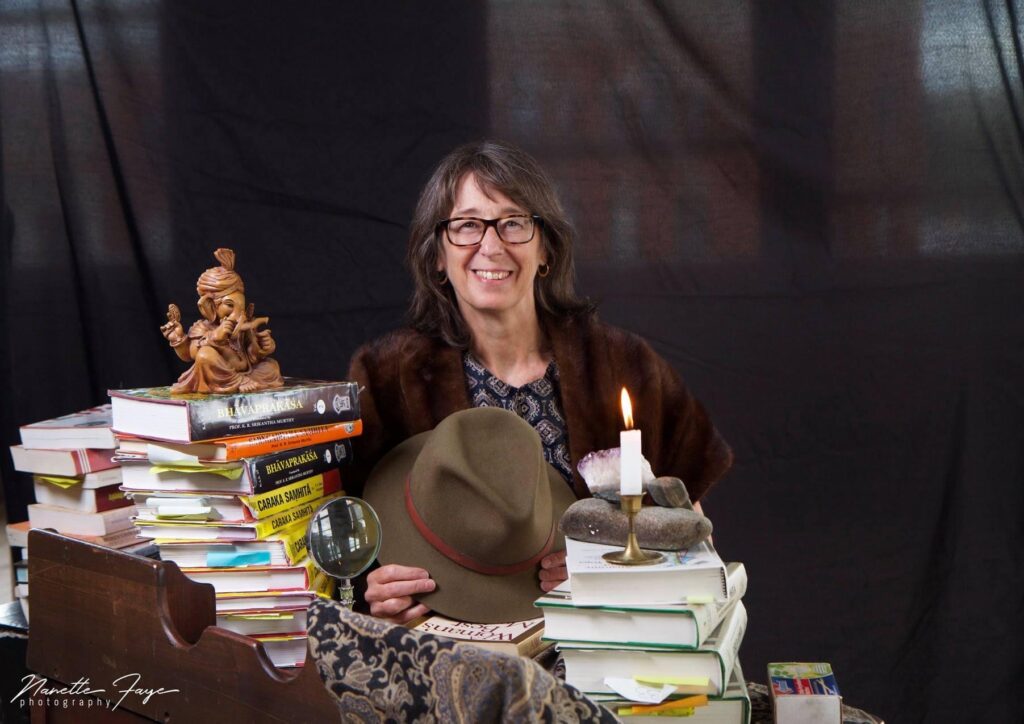Most people struggle with digestive issues or habits that don’t serve them. I offer a time tested, natural approach that brings awareness and restores intelligent control of one’s choices to lead a happy, fulfilled life. Very much like going to a Naturopath or Acupuncturist. We discuss your health in the present and the past. Recommendations are based on what you are going to be able to carry out successfully, gradually changing behavior and cultivating habits that support you.
From the free consult, you might see the value of actively making doable changes to get different results.
Depending on the level of imbalance and the amount of time and effort you are able to put forth, in addition to other variables, you could see changes in 2-3 months.
This is an active, living process, so what the recommendations were to start out, might indeed change in a few weeks or so and might even change again.

Āyurveda is a natural system of health and healing that has always existed. Though ancient, it is vibrant, dynamic, relevant and usable today. Worldwide interest and modern science are beginning to pay attention to these techniques for healing the body, mind, and spirit. Āyurveda is a personalized approach to prevention. It focuses on guiding you to a deeper level of self-awareness, so that you make choices that are right for your physical body, mind and spirit. Āyurveda pays particular attention to your digestion and daily & seasonal routines which ultimately impacts every other part your being.
Starting something new can can sometimes be a bit daunting. Our FAQ’s are written to help you develop more of an understanding of what is offered. If you have a question that you don’t see here. Please feel free to reach out to Linda directly.
It really depends on several factors.
Because we are all unique individuals and are impacted by variables such: time of day, amount of sleep, stress time in life, weather, and season our healing process will also be unique. In addition, there’s our unique mental state (which can have a range as well). And lastly, it depends on how committed we are to becoming more aware and to changing behaviors and thought patterns.
Having said all that, many people find that they see change and benefits with ayurveda quickly.
If one has gone to several doctors and tried several therapies and they’ve exhausted all medicinal options, that is usually how people come to ayurveda. In this situation, the imbalance in the body is likely to have increased. This means it might very well take more time to come to balance.
There are 2 approaches to healing in ayurveda. One is intense and deep requiring an extended stay in an Ayurvedic hospital and is overseen by an Ayurvedic team. When done properly, it yields amazing results. Many of the therapies associated with this approach are not legal in the US or need a western doctor to oversee, so we can’t always access them.
The other approach is to work more gently and slowly through food, sleep, sound, movement, meditation, herbal formulations and daily routine practices. Even though it is slower, it is still very effective. Actually, if you were to do the intense therapy, afterwards, you’d be instructed in the ways of the just mentioned approach to keep and continue to improve upon the results you obtained.
We hear this a lot from people who read about an herb on the internet and they start taking it. “It didn’t work.” “It didn’t do anything.”
We also hear people say, “I took it for a week and it didn’t do anything.” Or even, “I started to take it and I started to feel different so I stopped.”
Here’s the thing. Ayurveda has been around a very, very long time. The classical textbooks categorize, and list so much information on herbs and spices. These spices/herbs have been studied and used for so long. The practical result is that we know how an herb/spice works on the doṣas of the body. When a Practitioner instructs you to take ginger tea or to celery tea and take it at a particular time in a particular way, it’s because they are trying to support a change in your system. Because we know what the herb/spice does, we know what the outcome is.
If you take herbs/spices without knowing why you are taking them, maybe you’ll see an effect, maybe not. And even for us in ayurveda, even this experience gives us information by telling us what is not working.
No and no.
Ayurveda is much more than diet. Ayurveda is really a scientific system to maintain one’s health (prevention). Ayurveda also is a system to find our way back to health from illness.
Ayurveda is about building awareness. We really need to learn, relearn and remember how to listen and know what our body signals are and be able to read them them accurately for our own systems.
What makes food “ayurvedic” is the thinking behind the meal. It’s understanding the qualities and characteristics of ingredients and how they will interact with certain digestions. Basically, any (whole, cooked) food that is properly prepared and eaten at the right time of the day, in the right season is “ayurvedic”. Not all Indian food is ayurvedic!

Linda Rowe is the founder of lindāyurveda, an online and in person classical Āyurveda practice. Linda completed full programs with Dr. Paul Dugliss of New World Ayurveda and Dr. Anusha Seghal of Boston Ayurveda, Inc. In addition, Linda received formative studies with Maya Tawari, Jai Dev Singh, Dr. Jessica Vellela and Dr. Bhaswati Bhattacharya. The combination of the two complete programs, along with the additional variety of teachers means that Linda pulls from multiple Ayurvedic perspectives but which are also grounded in the classical texts.
All good health starts with a balanced diet. This free download will take you through 8 delectable and nutritious recipes that will increase your vitality and overall well-being.
"*" indicates required fields